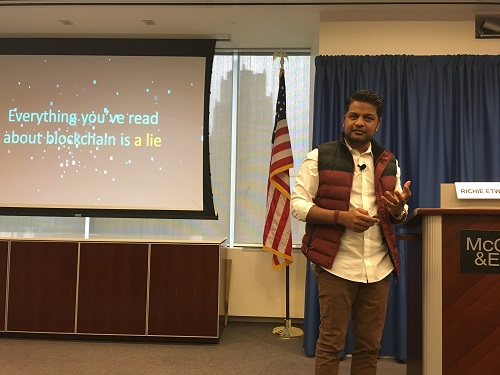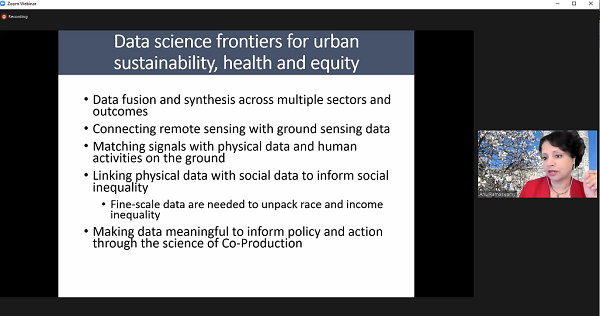Princeton Startup Hu-manity.co Believes You Should Decide What Happens to Your Data, and is Doing Something about It
Princeton startup Hu-manity.co is based on a big idea whose time is now, said cofounder and CEO Richie Etwaru during a recent interview.
At this time in human history, individuals do not have personal control over their data, which is “innately and inherently” theirs, Etwaru noted. His company has begun to solve this problem, starting with an app called “#My31,” which allows consumers to claim their personal data and decide what they’ll allow to be done with it.
If Hu-manity.co can get 100,000 people to sign up for the app and make choices about how they want their data to be used, the company believes that industry will sit up and take notice. Hu-manity.co is also lobbying the United Nations to declare ownership of data as the 31st human right. According to Etwaru, Hu-manity.co will start by helping consumers claim their healthcare data, and then move on to other markets once this is solved.
When NJTechWeekly.com talked to Etwaru, blockchain wasn’t discussed, but it is at the center of the Hu-manity.co solution. The startup has designed new intelligent contracts based on blockchain that humans can use to negotiate terms of consent and authorization with corporations, so that inherent human data can be respected as legal property. The contracts are built on a “chain of chains” strategy, the company says on its website, based on Ethereum and other “fabrics.”
Empowering People to Take Control of Their Own Data
“This particular problem of human beings not having control over their data has been something I’ve been studying for about 20 years,” Etwaru said. “I had arrived at the hypothesis that, at some point, humans need to be in the supply chain, when I founded my first company, called “License Monitor.” The purpose of that company was to buy driver records from departments of motor vehicles across the country, and sell them responsibly to trucking companies, so trucking companies could check those driver records to comply with federal safety laws for drivers of big trucks or drivers who take care of hazmat materials.
“I remember thinking that there must be something wrong here. I’m not the driver and I’m not the department of motor vehicles, but I can see these records and I’m making a profit from them. Everybody is in the chain except the drivers, whose data is being sold. It occurred to me that if this pattern of companies monetizing and using human data were to get bigger and bigger, at some time in the future humans will need to be included in that supply chain. It just would get too imbalanced after a while.”
Etwaru exited that company and began a career on Wall Street, where he oversaw the buying of data at a financial services company. There he used data to figure out who was going to falter on their mortgage or who was going to become an ultra-high-net-worth client. As he watched the industry grow, Etwaru began studying policy, reading all of the regulations to understand “how was it that this was legal that people weren’t part of the data equation.” By then, the data sets weren’t just driving records, they were credit reports, geolocation data and other information, he noted.
After his career on Wall Street, he spent five years in healthcare, becoming exposed to the healthcare data market. He realized that patients’ data was being sold in a market that, in the U.S. alone, amounted to multiple billions of dollars. “I thought the timing was right to try to solve the problem.”
Etwaru said that his cofounder, Michael DePalma, has also been studying this problem, for the last decade or so. “We were lucky to meet in the healthcare industry, and we shared a passion for solving this problem. We’ve seen this evolve over time, and we’ve been watching, studying and reading the regulations. We felt the timing was right to attempt to course correct this, which is evolving as a humanitarian issue, as there is an imbalance of power associated with it.”
The company was founded in April 2018. “The rate of syndication of this idea, the percentage of reception is pretty high from the press, media, politicians and the public.”
Etwaru’s customers will be companies that use data and make a profit from selling it. These companies will pay Hu-manity.co for access to consumers who have consented to the use of their personal data. Under this contract, the consumers will be paid for the data that is used by these companies, if they elect to do so, and the consumers can revoke their consent at any time. Think of this as people leasing their data. They can also choose to donate their data or decide to keep it for themselves.
“This is really about empowering a person to own his or her data, and have personal control over it,” said Glenn Zimmerman, chief communications officer at Hu-manity.co, “so compensation is purely one benefit to owning your data as your property.”
At no time will Hu-manity.co have actual possession of the data. Consumers whose data is being used for profit and who elect to be paid for that can expect to receive a minimal amount each year, say $150 or $125. People with unique circumstances — for example, someone with a rare disease that needs to be studied — could be paid $1,000, Etwaru estimated.
Corporations On Board to “Cross the Trust Chasm”
Etwaru said that he had received positive feedback from corporations currently using data without a consumer-inclusive framework, and that they were eager to work with Hu-manity.co. “Those corporations recognize that if they don’t find a way to cross this trust chasm, and be in some kind of new relationship with consumers, eventually they will likely be caught in the ‘Cambridge Analytica’ scandal of their industry,” whether it’s pharmaceuticals, financial services or transportation.
“Most companies right now are caught in a place where they are not using data ethically. We are the bridge to bring them into this new world. If they engage with us, and the consumers we have, they can start to behave in a more trusted or transparent way. We are supplying a capability for corporations that are currently exposed to trust and transparency issues around data, to be able to reduce their exposure,” he said.
#My31 Movement
The company is also working on the problem from a global perspective. It has initiated the #My31 Movement, concerned with the “31st human right.” The movement calls on the United Nations to ratify the 31st amendment to the Universal Declaration of Human Rights, which declares that all individuals have the right to own their inherent human data as their personal property.
“For us, it was about finding the right set of angels, who had the right amount of patience, who understood the area well enough so they could see the market opportunity, but at the same time had the ethical and moral compass to invest in something that had a social impact.” Richie Etwaru
Raising capital for Hu-manity.co involved finding angels that had the patience to wait out the results of a big idea. “Angels are different from VCs in that they tend to have more patience in the investment process. Venture capitalists have a shorter runway and a higher affinity for liquidity, whereas angels tend to have more patience because they aren’t confined to having to pay back the [limited partners] or [general partners] in their funds,” Etwaru said.
The two angels who backed Hu-manity.co came from Etwaru’s extensive network, which had grown during his 20-year career in data. He noted that he had approached some angels who didn’t have the kind of patience for this long-term play or who “cared more for the business model than the social impact.” If you’re a founder, one of the things you have to do is figure out the attributes of investors who would be the best fit for your investment opportunity. Not all ventures offer the same investment opportunities.
“For us, it was about finding the right set of angels, who had the right amount of patience, who understood the area well enough so they could see the market opportunity, but at the same time had the ethical and moral compass to invest in something that had a social impact.
“The capital was raised and agreed on in weeks, and not months. I think the main reason the angels were confident to fund the company was because of the team that was assembling around the company. While the idea was great and the timing was good, what gave the angel investors’ confidence was that people who were mid-career, where the opportunity cost of walking away from a C-Level job to do this is pretty high, understood this problem and saw it as a viable value proposition.”
While the angels who backed Hu-manity.co do not wish to be named, they are all Americans, and they are people who like to invest in things that they believe can course correct some aspects of the world, said Etwaru.
The founders are currently raising another round of financing. When discussing this round, Etwaru noted that the company had taken much of the risk out of the execution with a lot of customer discovery, pricing discovery and business model discovery, but “what we need to do is to get the company to recognize more revenue. Recognizable revenue means that we have to make sure we can turn on the market, can fine-tune the tech and that we hire some people around customer support and sales. We’ve had a tremendously low burn, considering what we’ve accomplished from a tech perspective.” He added, “We’ll have to start compensating more people as we look forward to revenues.”




